#love when heroes have a capacity to kill. love when people fail at being heroes.
Explore tagged Tumblr posts
Text

mr action hero
#until dawn#mike munroe#wolfie#midnight draws#love when heroes have a capacity to kill. love when people fail at being heroes.#mr munroe.....#play You Can't Count on Me by the Counting Crows!!!
111 notes
·
View notes
Text
Writing Tips - Overarching Themes
A lot of stories like to have overarching themes, such as themes of redemption, acceptance, ruthlessness, love, etc. But how do you come up with the themes for your story?
1. Don’t lose the plot. What kind of journey does your plot take your characters on? What do they achieve and what do they learn along the way? Off the top of my head Miraculous Ladybug doesn’t do a great job at portraying an overarching theme of ‘love conquers all’ when love repeatedly causes problems for the heroes (to the point of “It was our love that destroyed the world” being one of the most memorable lines) and only seems to benefit the villains. Let the plot help keep you on the right track
2. Ask a question. There are tons of themes that rely on asking a question and pitting two different virtues against each other; traditional vs modern, redemption vs damnation, nature vs nurture, etc. The theme of the story is then watching one conquer the other, or finding out where the balance lies between the two if that’s more applicable. ATLA was, of course, very good at handling the nuances in redemption and damnation; it showed people learning they need to change, people wanting to change, people choosing not to change, people trying and failing to change, and even people with the capacity to change only if they take it. The episode The Southern Raiders is also a masterclass in nuance in revenge vs forgiveness, and ultimately allows the audience to form their own conclusions
3. Add a twist. One thing that really intrigues me about EPIC: The Musical is how the overarching theme is ruthlessness vs mercy - with the lesson being that main character Odysseus needs to be more ruthless. You don’t get a lot of stories that teach ruthlessness as the good and correct answer over mercy, that you should kill a defeated opponent rather than letting them live, and that makes the story so much more interesting and unique. If you can think of a way to intentionally twist the expected outcome of your overarching theme, see if you can make it work within the story
4. It’s overarching for a reason. Make sure your overarching themes are evident in the story and impact the characters and their decisions, as well as the consequences for such. Hazbin Hotel has an obvious overarching theme of redemption, and you can see it in the way each episode plays out that redemption comes into it, whether it’s Vaggie regaining her wings when learning to fight for love rather than vengeance, Charlie giving Alastor the chance to work in the hotel despite knowing he doesn’t believe in her goals, Husk encouraging Angel’s character growth and his true nature, etc. Almost everything the characters do relates back to the theme of redemption and betterment
5. Reward the theme. Maybe in the past characters have been burned before and no longer believe in your overarching theme, but the course of the story changes their perspective. The Owl House has overarching themes of non-conformity and individualism and acceptance of those who are ‘weird’ or different, and they all culminate in Luz finally feeling understood for the first time in her life after never feeling that way. Attempts in the past to be understood have often been met with people labelling her as the weird kid or her being punished, and then throughout the story there’s a lot of people that accept Luz, but in more of an “I don’t get what you’re saying, but I get what you’re trying to say” kind of way; acceptance and understanding aren’t quite the same. And lacking acceptance has negative impacts in the story for good and bad characters alike; Luz is at her most powerful when she accepts both the human and witch side of her rather than comparing herself to Azura, Amity’s potential for redemption comes only when she accepts Luz as a witch, Belos loses his power when he’s no longer accepted by others, etc. Characters are rewarded for following the overarching theme and punished for straying
#overarching themes#themes#writing themes#miraculous ladybug#avatar the last airbender#epic the musical#Hazbin hotel#the owl house#writing tips#writing tricks#writing tips and tricks#writing advice#writing#writers#writeblr#bookblr#book#writers on tumblr#writerscommunity#writers of tumblr#writer#creative writing
81 notes
·
View notes
Note
I've perfectly understood protagonist and antagonist, but now I've lost understanding on heroes and villains. I used to think, unlike antagonists, villains are usually evil or have malevolent intent. But when I think about it, that's not what I see in most stories. When I plan out my own story, I always fail to make anybody evil - including the villain. I just don't think anyone is evil. I don't believe in it. So now my understanding of these archetypes are all messed up.
Heroes and Villains
Bear with me while I try to unpack this, because what you've stumbled into is a philosophical quagmire...
I think where you're getting hung up is the discordance between the definition of true evil, and the loose application of the word to anyone or anything that causes harm. Complicating matters is the popularity of morally gray villains, which is what I think you say you're seeing ina lot of stories.
The Routledge Encyclopedia of Philosophy defines "evil" as "the most severe condemnation our moral vocabulary allows. Murder, torture, enslavement and prolonged humiliation are some examples of it." The definition goes on to explain that evil must involve serious, unjustifiable harm that causes suffering and damages the victims' capacity to function normally.
The keyword here is "unjustifiable," though, because... and here's where the philosophical ramifications come into play: what is and isn't justifiable can be up for debate, as is who gets to decide that.
I'm sure you've heard of the "trolley problem." If there's a runaway trolley heading toward five people stuck on the track, and you can pull a lever to divert the trolley onto another track to save them, of course you'd do it in a heartbeat. But what if there was one person stuck on the other track, so you'd be killing them to save the other five people. What do you do then? On one side, there are all sorts of arguments about the greater good, sacrificing the few to save the many, and the potential immorality of doing nothing. On the other side, you have arguments against "playing God," interfering with fate, and turning an accident into a deliberate decision to kill.
And then you get into the persnicketiness of justifiability, because killing the one to save the five is justifiable to the five people, their loved ones, and people arguing on the side of the greater good and the immorality of doing nothing. But, killing the one is not justifiable to the one who dies, their loved ones, and the people who argue against playing God, interfering with fate, and turning an accident into a deliberate decision to kill. So, no matter what you do, it's unjustifiable... but does that actually make you evil? Of course not.
And that's where things get complicated with villains in fiction and how we apply the definition of evil. One of my favorite villains ever is Niklaus Mikaelson in the Vampire Diaries universe. He's one of the original vampires... a young Viking man, abused by his father since childhood, cursed with immortality as a means of protection by his well-meaning witch mother. This leads to him and his siblings being chased by their father-turned-vampire-hunter through the centuries. Klaus's ultimate motivation is to protect his family, but as the lengths he goes to become increasingly more harmful, the justifiability of his actions becomes increasingly twisted. Klaus is certainly evil by definition of causing unjustifiable, serious harm. However, when we start to look at who he is, why he is the way he is/does what he does, and his overall motivation, we get into some gray areas.
Which is why morally gray villains are so popular in fiction, because if we can argue what is and isn't justifiable, and who does and doesn't get to determine that, things start to get really complicated, making fiction a fertile ground within which to explore the concept of evil, good vs evil, morality, etc.
So... having said that... I think you know what antagonists are, and I think you know what villains are. Don't get too caught up on the idea of pure evil. You can have a villain who causes harm for reasons that are justifiable to them or others, even if the majority of others would not see it as justifiable.
I hope that helps rather than muddying the waters!
•••••••••••••••••••••••••••••••••
I’ve been writing seriously for over 30 years and love to share what I’ve learned. Have a writing question? My inbox is always open!
♦ Questions that violate my ask policies will be deleted! ♦ Please see my master list of top posts before asking ♦ Learn more about WQA here
93 notes
·
View notes
Text
About the idea of Legend and Fable being siblings
You know, I love the idea of Legend and Fable being siblings because…
…It could actually make sense. and it could have a reason to exist.
Time died in this timeline, whatever it was a timeline where he didn't have the seven years gap and get killed as a child, either he failed during his final fight as adult.
Whatever how Time died, he died. Hylia's hero failed, because he was too young, not enough experimented, ect…
Lullaby/Zelda barely managed to do something after Time's death and the situation was not great. For years, centuries, it has been terrible.
It was the start of the Downfall Timeline.
Years and years after the death of the poor young one, Hylia realized that Ganon was going to return. That she had to trigger the two reincarnations, Zelda and Link, to stop him. Or it would be the end of the world.
But she didn't want to make the same mistake. Link wouldn't be a nobody or a helpless child. He would have more power. So he would be more armed to face the menace, more prepared.
He would have the blood of Sky, her second hero, he would have the blood of Four, who married his Zelda at his Era. And he would have her sacred blood. The kid would be powerful. So he wouldn't face a tragic end.
And so Legend and Fable were twins.
What Hylia didn't plan was the reaction toward a little prince. Good thing, the mother of the twins refused to let her baby die and asked to her most faithful personnal knight to take the baby and to protect him. He accepted, thinking that killing inocent baby was a horrible thing, whatever a prince was a monster ONE time, this baby didn't do anything.
The twins didn't grow together, of course. Legend was a energic kid, and he was very smart for his age. He was able to speak to animals and to trees. At first his uncle didn't believe him but was forced to do it when faced the truth. Legend was a sensitive kid who always wanted to help people. He didn't want to become a knight but he liked the sword traning.
Sadely, the events of Link to the Past happened a lot sooner than Hylia had planned. Legend was barely eight. (Hylia has really failed her tactic to kill Ganon with a prepared adult, yeah)
He had some training with a sword, but wasn't a soldier. He survived to all the trials until finding Fi. Because he was talented, smart, lucky.
Fi was…not in a good state. Nobody hads taken care of her since the death of the previous hero. She was forgotten. She had still his blood on her. And then this tiny child take her in his little hands and she recognize her master's blood, he hears her voice. She sees how much he was young, fragile, still innocent and decided that no, this one wasn't going to die.
So Legend, without knowing it, has learned some of Sky's fighting style thank to Fi.
He has reforged her with his tiny hand, treating her as the most precious thing in the world.
He was always holding her when sleeping because he had a lot of nightmares for obvious reasons.
And Fi corrected his movements in a fight.
He could hear her because of Hylia's blood and because of Sky's blood in his veins.
And so the idea of Hylia, after the death of the previous hero, deciding to reincarne her hero as Sky's descendant, as her descendant to give him more powers, more capacities to survive….is very interesting.
And imagine, during the events of Linked Universe, Sky being like "you have the same fighting style than me?"
"The master sword teached me!"
"She SPOKE to you *o*?"
#lu#linked universe#lu legend#Legend#Sky#Lu Sky#Lu Time#Time#Lu FI#Fi#Hylia#Loz#lu meta#Legend and Fable being siblings#lu fable#fable#Downfall Timeline.
128 notes
·
View notes
Note
may I know your shb+ WoL’s thing with emet. and origins. I come in peace 🕊️ despite my tendencies for real I am curious
i spent three hours writing this. lol
so yann comes from a damp and isolated fishing and shepherding community but he was too restless for that stuff alone to satisy him. he wanted to learn aetherology and read about ancient civilizations and see how other people lived. when he tried to leave his designated fleck of earth in the middle of the cold cold ocean however everything fell apart. academically the studium was amazing but socially he was just some kid from buttfuck nowhere with (what his patronizing fellow scholars looked on as) his naive indigenous traditional magick. he struggled making friends because he was unmannerly and lowborn. then moneylenders came after his family and infant sister who had to flee to limsa and go into hiding, the lender's hired heavies threw him into the drink where he almost drowned, just everything went to shit. he couldn't graduate. when he went to eorzea to pay off the debts (which his father took on so he could go to the studium in the first place) people ended up thinking he was just another moneygrubbing adventurer. he's been constantly misunderstood for most of his life and has never felt a part of anything, and each time he gets close something horrible happens, for instance the disaster at carteneau wherein his geomancy went awry and killed a bunch of allied soldiers along with his garlean targets. yet people won't let him stay out of it. they're constantly calling him a hero and begging for his help even though he's obviously been despised by nymeia since he was conceived. just once he'd like to hear the truth from someone and not what is useful for them to believe.
e-s tells him he's already failed but it's fine, whatever. he's failed thousands of times. and there's no hope for him to succeed in norvrandt, and the more he thrashes about trying the more likely he'll take all his friends with him in death. it's exactly what his diseased brain wants to hear.
depressed people fucking love things and people that reinforce their sick self-destructive worldview even if they claim otherwise (ask me how i know! actually don't). as i have previously written his emotional support thancred is not available in this situation, so he just starts drifting toward e-s. he spends a lot of time telling himself it's academic interest in the thousands of years' worth of knowledge and aetherological experience. meanwhile the unsolicited tender and nostalgic gazes REALLY make him feel a certain kind of way, not because he remembers being azem or anything but just because he's gay and lonely. what he loves most about e-s, though, is the invitation to embrace entropy and stop fighting.
this union is never consummated. but everyone can sense the tension. it is not good for the scions. they all call yann "my friend" and shit but now they are realizing they do not actually know him at all. there is a lot of fighting about unrelated things in early edw as everyone sorts out their feelings. alisaie gets pretty fucked up about it but the number one victim is g'raha. imagine loving and idolizing a guy so much you unwind the skein of time itself to save his life and he not only picks someone else but picks someone else who tortured you.
meanwhile e-s was dead and yann was not getting over it. elpis happened. and yann is in heaven. he gets to see the person e-s was before he was corrupted! and his friend hythlodaeus! in this idyllic place! he's always loved the past--why shouldn't that be where he belonged all this time? perhaps he should stay here forever. when he saw the sham amaurot and started learning about the world that'd been lost he'd already been thinking along these lines. but the e-s of this time hates him. shockingly, hades has even less capacity to understand the sundered as human than e-s. fucking azem flouting amaurotine laws by making some kind of familiar with a soul. of course he would. hythlo wants to play with him like a toy because isn't he darling and isn't the idea so fun? it breaks his heart but it also wakes him up--and at that point he finally starts leaving his yearning behind.
as for azem and e-s (or rather dionysos and hades), they were in a relationship through much of their time at anyder and afterward until it came time to stop playing around and serve amaurot. dion cared more about travelling and helping people in rural demes and hades cared more about civil service in the capitol. neither would yield--dion thought hades was being a pigheaded shut-in and hades thought dion was being frivolous--and they had an extremely acrimonious breakup about it. my favorite story about them is that after about five years or so dion started sending letters, apologizing and telling hades about all the things he'd seen on his way, but hades never read any of them and instead threw every one into the trash without opening it. hythlo--who already sneaks into hades' garbage to look at his discarded research drafts because he thinks he's the world's greatest genius and takes a pathetic sort of pride in knowing him more deeply than anyone else--fished them all out and kept them. he later puts in a lot of work into normalizing diplomatic relations as it were. even so, e-s still votes against dion being inducted to the convocation as azem and drags out his nomination process (which i hc must be unanimous) as long as possible. partly out of spite but also because he still has feelings for him and life is easier if he doesn't have to see him every day.
8 notes
·
View notes
Text
Loved this Council meeting.
Princess Rhaenyra making a good point…

And Alicent drowning in her sorrows because she can’t stand Rhaenyra being right. But she doesn’t have any counter argument against her reasoning in relation to the Bracken - Blackwood incident, does she? She acts like a “mature” woman, rolling her eyes, smirking and drinking (*cough* Cersei 2.0 *cough*).
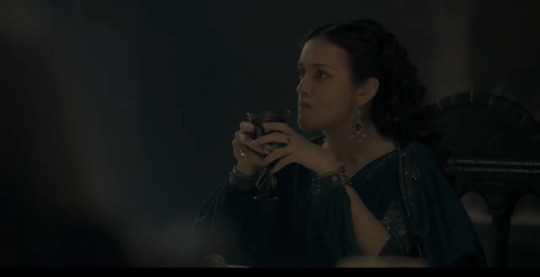
And then there is the matter of the Stepstones. Daemon is a war hero, fought hard and single handedly killed the Crabfeeder. He was named King of the Narrow Sea, but gave up this honor, gifting the Stepstones to the Crown. He deserves the utmost respect for that.
And some bearded idiot (I don’t even know who he is), dares to belittle his great victory. Alicent doesn’t miss the opportunity to put the whole blame of losing the Stepstones on Daemon (even though it wasn’t his responsibility) simply because she dislikes him.

And when Rhaenyra makes valid points once more, defends Daemon and rightfully scolds the Crown for not protecting their own lands…
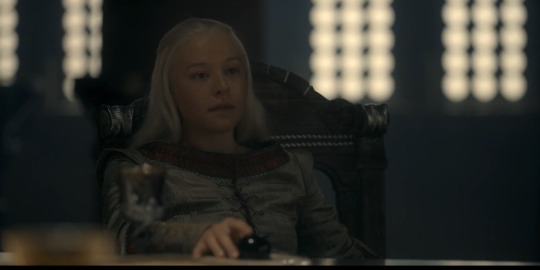
This woman is desperate to prove her wrong and fails miserably. She doesn’t even present a counter argument to prove her reasoning that Daemon is to blame. She immediately moves to “We cannot afford it.” Aha. So you admit that it was the Crown’s responsibility to defend the Stepstones, not Daemon’s.
As for the costs, like Rhaenyra says, “Cost of war is greater.” One way or another, the people have to pay taxes. Either they pay a more reasonable amount for fortifications or they will pay a humongous amount when war is on their doorsteps. But Alicent doesn’t have the capacity to understand that, and doesn’t provide reasonable arguments, just unreasonably rebuffs anything Rhaenyra has to say. As if it would kill her to admit that Rhaenyra is 100% right.
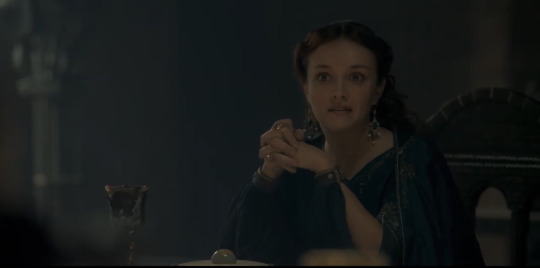
How mature of her. She has no leg to stand on (they’re probably off to be polished for her special night with Larys), acts like she is the smartest person in the room (Cersei impersonator), and then cries that she needs her father, because no one else is partial to her.
The Realm suffered greatly under the time she ruled in Viserys’ place. She and Otto ignore the smallfolk (confirmed in episode 9) and have no other interest other than promoting those of House Hightower and advancing their family’s position.
They’re a bunch of social climbers who are truly simple minded when it comes to politics. Reminder: Otto made the same reasoning mistakes at the Council meeting in episode 1, when he was trying to undermine Daemon, and Daemon pretty much check-mated him. Otto has no counter argument and changed the subject to Rhea Royce just to try and get a rise out of Daemon. This just proves what terrible political minds Otto and Alicent actually have. I mean, what can you expect from a handmaid turned queen through deception and a power hungry father?
Alicent had a good time abusing her position to make Rhaenyra’s life miserable. Can’t wait to see the tables turned.
Rhaenyra has demonstrated diplomatic finesse, a good strategic mind and potential to rule, which is more than can be said for Alicent, her snake of a father or her “precious children”.
#house of the dragon#team black#rhaenyra targaryen#pro team black#queen rhaenyra#the black queen#hotd rhaenyra#hotd alicent#hotd daemon#hotd season 1#hotd episode 6#daemon targaryen#king of the narrow sea#anti alicent hightower#alicent hightower#anti alicent stans#anti greens#anti team green#anti team green stans#anti otto hightower#hotd#house of the dragon season 2#anti house hightower#anti green stans#Alicent Hightower is Cersei Lannister reincarnated#otto hightower#pro rhaenyra#prince daemon targaryen#pro daemon targaryen#hotd fandom
102 notes
·
View notes
Note
What do you think are Itadori and Junpei’s greatest personality strengths and weaknesses? Why? What do you love about their dynamic?
ANON!!!! I'm crying sobbing thank you for sending me this. Ah I feel a little bad for posting that vent(?) post about not being asked about itajun(once again, i think itafushi is super cute no hate multishipping and minding our own space in the fandom corner ftw).
BUT ITAJUN NOW AHAHAHA
I think Yuuji's is easier to narrow down since he's our protagonist!
Strengths:
JJK often shows Yuuji's kindness, empathy and desire to give everyone proper deaths even if saving everyone is a lofty, unrealistic goal but I love that despite this insistence, Yuuji sticks to it. That conviction is being changed from something wholly idealistic, almost like a hero, to something far simpler ( a cog in the machine), but I still think Yuuji deep down will always want to protect others no matter how battered he is, which is amazing.
His self-awareness! We all know he's not the sharpest tool in the shed but it's not really necessary. He's very aware of his own shortcomings and doesn't take it too seriously when he sees himself falling short, but uses these reflections to grow stronger, to learn more.
Weaknesses:
Is it bad if I say I don't think he has any? I just, cannot think of anything I think are genuine, detrimental flaws in Yuuji....maybe...
He's too selfless. He doesn't think about himself in any capacity to the point he never confronts the traumas he goes through. His grandpa's death affects him a LOT but we never see him properly mourn, Junpei's death still haunts him but he never talked about it with ANYONE (sad that the only person who knows the depth of that loss is Mahito), Shibuya arc and the guilt he feels from Sukuna's actions, his own paralyzing terror of his death. It's really heartbreaking to see.
He trusts too easily. Or he used to. In the manga he's stopped and is a lot more suspicious of strangers(and potentially even people he knows). It's sad but I guess this is the only place he could go after all the suffering.
Onto Junpei!
Strengths:
He's very open-minded. Mahito exploited Junpei's ability to give everyone a chance in order to manipulate him, but this trait is very good in exploring the world and learning more about oneself and others. He didn't enjoy Human Earthworm 2 but he still sat through it multiple times because he thought it had something good to offer. Even when he was mourning his mom & suspected Yuuji of being involved in killing her, he paused and heard him out. It was his downfall, but I think if he was shown more support and given the space to be sure of himself, this trait would have been a huge strength as sorcerer. Geto was trying to be very rigid in his morality, and it led to his downfall, so someone who's flexible and can adjust would last longer.
He's actually very kind and hopeful. It may not seem like it since his opening line is "if i had a button to kill everyone who hated me, I'd push it" and the school attack BUT. Even then, he tries to be indifferent to the cruelties the world has imposed upon him, and fails, because he just can't stomach the fact that other people are capable of inflicting the kind of cruelty he experienced. He can't fathom that his fellow humans can do this. Which, deep down, means he had hope for people to be better. But they failed him. If he had gone to Jujutsu Tech, I think him and Yuuji would have acted as a check-and-balance system for each other's morality and value of human life, and found a positive outlook together.
Weaknesses:
He can't make up his mind because he has zero confidence in himself. Which is fair, considering everything he went through. He keeps looking for validation from others instead of forming his own thing and sticking to it.
He detaches himself from others. Also fair because people have let him down all the time but it goes too far.
Them as a dynamic!!
AHHH! Okay I think Gege Akutami purposefully wrote them to be very compatible as friends(and for my reasons, boyfriends too hehe). This story arc had to have a HUGE impact on Yuuji. Junpei's death is so central to Yuuji's character arc, it's the first domino to fall in Yuuji realizing that he can't save everyone no matter how much he loves them, how much he wants to. But it also needed to be done in a very short time span.
What's the best way to do that?
Give Yuuji a dream and rip it right out of his hands.
So they fit into each other fast and strong. Yuuji can read Junpei like a book and accommodates to Junpei's needs (Yuuji getting rid of that teacher because he saw he was uncomfortable around him, sitting with Junpei at that riverside and being open with him).
Junpei wants to listen to what Yuuji has to say(which is a rarity in jujutsu tech, Nobara dismisses him ranting about Human Earthworm 4, Megumi's very closed off and takes a lot of time to come out of his shell).
The rest of the cast treat Yuuji likes he's an idiot, and when they do hold affection/positive regard for him, they never tell it to him so the story and environemnt feels very hostile. Junpei is treated with a lot of violence and hostility as well.
But when they meet, there's a breather to have fun. talk about silly things and just be teenagers.
Neither of them get the chance to just wind down and I think they gave each other the space to do that. Which is what I love about their dynamic. They bring out the best parts of each other. If they had a bit more time, they could have been so fun to watch interact. Despite their short time together, Yuuji still thinks of Junpei and has a lot of regrets over him.
I think they're the perfect example of "right person, wrong time." If they had met even a little earlier, things could've been different. They were each doomed the moment they met. The 'what-if' that the anime/manga presents is so good that it has me hooked even after 3 years ;_;.
Thanks again for the ask! Sorry for the giant ramble!
19 notes
·
View notes
Text
i'm sorry bangel shippers, but i just cannot GET OVER the fact that angel is such a bad person without a soul.
like. hear me out. it has been proven that a vampire without a soul (aka a normal vampire) isn’t necessarily pure evil, shown through spike. a vampire is made when the person gets bitten, their soul leaves their body, which then gets re-animated by a demonic energy, which rises it from the dead with vampire powers. it retains characteristics and personality traits of the person who died, but is mainly overcome with a perpetual thirst for blood, coupled with a lack of empathy. yes, it is true that the only reason spike didn’t kill anyone through s5/6 is bc of the chip. but it is also true that he DOES feel empathy, remorse, guilt, and even love.
spike may be more human than most vampires, but that has never actually been confirmed mythologically. he is still a vampire without a soul. yet, he can still experience love and loyalty enough to withstand the worst torture in order to protect dawn. he can still feel immense guilt when he failed. and while his motives are usually selfishly-based, he can still be selfless, shown in spike looking after dawn even after buffy is dead. this shows that he is not just protecting dawn to get closer to buffy, as that was obviously impossible. he did it because of his enduring love for buffy, because dawn is a part of buffy, because buffy died to protect dawn, because spike respects buffy and her wishes, because dawn is a part of buffy. spike does not have a soul throughout all of this. that begs the question: what does having a soul truly mean?
as dawn mentions, people with a soul can still do terrible things, and people without one can still do noble and good things. this obviously means that a soul does not equate to goodness. mortal murderers and rapists still exist, and they have souls. yet they are capable and find pleasure in the most evil of actions. we even see some demons, like clem, who are good ordinary people, despite the fact that they are a demon without a soul. from this i maintain that:
a soul cannot create goodness, it only amplifies what is already there.
so. when spike goes through the trials and earns his soul back for buffy, he comes out the same man reborn. he is spike the vampire, and he is william pratt, and he is none of them, and he is both of them. he is not completely different from before, but there is something irrevocably changed. he can now feel the full embodiment of human emotions without them being obstructed and twisted by a demonic inhabitance. the soul didn’t give him a personality transplant. it only amplified and de-obstructed the goodness that was already there; already in his heart — the goodness that showed itself in glimmers when he didn’t have a soul, but could not full actualize.
this is why i have a bit of a problem with angel (not as a character, but as the soulmate of the hero). angelus is completely estranged from angel. angelus does not conceive and in fact is revolted by human emotion, and any empathy, guilt, remorse, or love is completely erased from him. this means, if we are going to apply the facts, that there was not much there to begin with. there was not enough goodness to amplify with a soul; for as soon as it is taken away, any and all goodness is eviscerated. i am not saying souled-angel is a bad character, and he definitely did his penance and does good, but this post isn’t really about that. this isn’t about what souled angel did. this is about what angelus did, and why the man beneath the soul was not worthy of a soul and did not fight for one. angel was cursed with his soul. spike, without a soul, fought for his. this shows that soulless beings have the capacity to desire and achieve ultimate redemption (if they are worthy).
i am not saying bangel shippers are wrong or that it is a bad ship. i don’t hate it. but i am expressing why i cannot get on board with angel as buffy’s soulmate or her “best boyfriend” or whatever. there are too many factors that don’t get considered when it comes to buffy and angel’s relationship. the reality is largely clouded by her strong feelings for him that derived out of him being her first love. she will never love anyone the way she loved angel, because when you are 16 years old, everything is huge and important and unique and end-of-the-world stuff (pun intended). knowing and seeing the sheer horrors that angel commits as soon as he loses his soul is...worrying. even with all his time repenting as angel, i still can’t imagine loving someone who shifts into a complete psychotic evil serial killer any time they are truly happy, when i KNOW what soulless vampires can feel and do. idk thanks for reading
#just me ranting dw#i dont hate bangel but its complicated as u can see#anti-bangel#just using that tag out of respect for sensitive peeps#btvs#buffy the vampire slayer#spuffy#btvs meta#btvs discourse#btvs rant#mine
192 notes
·
View notes
Text
THE MAN WHO WANT IT ALL VS THE MAN WHO LOVE IT ALL:

There's a trope that has been going around since the day humanity started thinking about themselves in relation to the universe: the finite nature of the man in contrast to the infinite nature of the world.
Our time is limited. We are born, we live, we die. That scares us as a race, because we don't know what's beyond the death line. We are scared of dying, we are scared of working our whole lives to then lose it to the darkness. And from that fear, rises the stereotype of the man who refuse to die, the man who wants it all.
Wanting and loving are two different things.
The man who want it all wants to own, wants to rule over everything that exists, because he's so afraid of being just a tiny piece of a greater game that he wants to have absolute control. You see, like a spider in a web, his threads are easy to break when you're a greater figure, but they are also resistant enough to trap any being tinier than him, so that gives the illusion of control he wanted so bad.
The man who loves it all is afraid of dying too. The difference? He accepts his time and place, and instead of focusing on owning things, on trapping things, he spends his time admiring them in their freedom, loving them as they come. If our time is finite, instead of making it last forever, we should enjoy the time we have. That's what the man who loves it all thinks.
Thinking about the Shigaraki siblings, about the meaning behind All For One and One For All, I came to the conclusion that mha / bnha is the story of the human race struggling to understand how should they live.
Many times in the manga we have encountered characters that think their quirks or their abilities makes them superior. But it isn't quiet true, because the human body is a fragile thing. Not matter how strong it is, time affects it the same. Evil lords like AFO get old, weak kids like Deku grow strong. A quirk can be trained as much as a body and a mind can be trained, so strength is not the variable they should take as a foundation to their world.
The same happens with intelligence, beauty, speed, money, power... They don't last in the hands of a man. Those are things that one can win and lose in an instant.
The answer is simpler than you could think.
It is men who choose who they are and what they're going to be, as long as they understand their limits and capacities.
Take Mirio. In order for him to become a great hero, he first needed to understand his quirk and then work based on that. He understood himself, he accepted himself and then he grew.
Take Deku. What makes Deku a Deku? His love for humanity. He's always observing, always studying, always connecting. When he focused his quirk on what he was, instead of trying to imitate All Might, he understood how he could grow. He's the kid who's built on his love for other beings, so he takes a piece of everything he loves and he is who he is.
It's not enough to want. You need to love.
Overhaul wanted it all, but he failed when it came to love. Why? He indeed loved things, but he forgot to accept his limits and capacities. He tried to do more than he could, he forced the people around him passed their limits, and everything came crashing before him.
AFO, with all his powers, lives hiding, frustrated because he can't obtain the only thing he "needs" in order for him to control the whole world. But can he take it? Would that be enough? Once he has everything, would he be happy? Or is he trying to obtain everything to cover up a bigger pain in his heart?
The reason why Yoichi could develop One For All is because he loved so much, that he knew he was going to die, but it was not the end. Our lives are not the end of the world. There's more people, future generations. What AFO couldn't accept (he not being immortal, he not living forever and being able to have it all), was what made Yoichi so powerful.
AFO, as a being, can't be going on forever. But you know what can go on and on endlessly? The repercussions of our love.
The vestiges are a symbol of that. Even if we can't name them, that people that came before us lives in the things we do. The users of One For All didn't want to live forever, but they wanted to protect others, save others, give others the chance to live their times. Contrary to AFO, their lives were short, they die not owning that much, they were very mortal and almost simple.
Do you remember what Nighteye said when he saw how Deku changed the future? It was not only his will, but the will of everyone, fighting so hard to, that changed the course of time.
One For All. One will, one wish, one continuous time for all of us. We live in the same world, it is mine as much as it is yours. Sacrifice our lives to protect everyone, do our best to defend everyone. Love doesn't judge, it loves even the worst beings, because it's capable of finding light in the deepest of darkness.
All For One. Since the beginning, AFO was destined to fail. His body is mortal, he is mortal, so he can't take the whole world, he can't take all the quirks, he can't live all lives. All he does, for one fear: dying. He can't avoid it. The more he tries to stay in control, the more he loses. If the target is too big or there are too many flies on his web, the threads eventually break.
We are born, we live, we die. Not matter how much you tried to kill it, hope always finds a way to come back. And not matter how much you try to keep it alive, evil dies as everything else does.
One last question: Does Shigaraki Tomura resembles the man who want it all or the man who loves it all? Is he trying to control everything or trying to break a web? Is he a parallel of Yoichi or a parallel of AFO?
Or maybe, can he be the personification of that duality? Can he be the point where the two things meet? What makes us complex as human beings? Is he not a thing or the other, but the ultimate consequence of the Shigarakis fight, along with Deku?
#Shan's bnha meta#Shan's mha meta#Boku No Hero Academia#Bnha#Bnha meta#My hero academia#Mha#Mha meta#AFO#OFA#yoichi shigaraki#Overhaul#kai chisaki#lemillion#Miro togata#Nighteye#Midoriya Izuku#Shigaraki Tomura#Deku#Bnha spoilers#Mha spoilers#Long post#Shan's mha rants#Shan's bnha rants#League of villains#LoV#War arc#Vestiges#My Villain Academia
112 notes
·
View notes
Text

I posted 1,275 times in 2022
152 posts created (12%)
1,123 posts reblogged (88%)
Blogs I reblogged the most:
@samdyke
@sunforgrace
@castiellesbian
@fuckspn I'M one of my own top reblogged blogs?? girl help the snake is eating its own tail
@4x01
I tagged 522 of my posts in 2022
#the fuckspn rewatch - 62 posts
#the greatest hits - 10 posts
#heritage post - 6 posts
#oh you know - 3 posts
#prev x2 - 3 posts
#sorry op - 3 posts
#i still think about this post sometimes - 2 posts
#shattered - 2 posts
#prev - 2 posts
#screaming and shaking and spitting phosphoric acid - 2 posts
Longest Tag: 139 characters
#but i’ve only seen up through tombstone so my choice of s8 and s11 is simply because they’re the later seasons i watched almost every ep of
My Top Posts in 2022:
#5
okay but there really is something so malicious about how supernatural was allowed to acknowledge dean’s Intense Subtextually Gay Relationships With Men and how they’re Clearly Different From Sam’s Relationships With Those Same Men as long as it’s all directed at the other character. anyone and everyone was allowed to make cracks about cas and crowley being in love with dean for years on end but when dean admitted that his relationship with cas is different than sam’s--i lost cas and it damn near broke me--the line had to be cut. yeah these guys’ relationships with dean are different than their relationships with sam but it’s all because of them being the weird gay ones who insisted on falling in love with dean despite his valiant heterosexual effort to keep them at a platonic arm’s length. of course dean wasn’t allowed to reciprocate cas’ feelings or react to the confession or even be particularly nice to cas because if we acknowledge that dean is part of the reason deanandcas is so different from samandcas then we’re also acknowledging that the gay subtext isn’t just coming from cas but from dean too, which means we’re acknowledging the possibility that our all-american marlboro man action hero isn’t straight. and we can’t have that because it failed the market research
1,261 notes - Posted September 6, 2022
#4
EXTREMELY fun night for terminally online people
1,355 notes - Posted April 25, 2022
#3
claire novak is genuinely the best character supernatural ever came up with. she’s a bitch. she’s empathetic. she’s bratty. she’s selfless. she held a sword to a random teenager’s throat. she has abandonment issues and struggles to accept the love of her adopted family as a result. a gay angel is possessing the corpse of her biological father and using it to have sexual tension with her surrogate father figure. she has a saintlike capacity for love and forgiveness. she is determined to kill and cannot be stopped. she’s a dean mirror. she was a werewolf for a hot second. she’s holding dean’s dvd of caddyshack hostage. she actively refuses to go to college. she broke the unbreakable cycle of violence by forgiving the supernatural creature that destroyed her family instead of seeking revenge. AND she’s a lesbian
1,476 notes - Posted September 13, 2022
#2
how do you even come back from this. how do you survive doing something this embarrassing. i literally think i’d fake my own death and move to a 12-person town in the canadian wilderness
1,565 notes - Posted April 25, 2022
My #1 post of 2022
saw trap voice hello, jensen ackles. your spn prequel is at risk of cancellation due to low viewership. you know the only way to save the show is to renege on 12 years of homophobia and make destiel canon for the third time. if you refuse, the show will be cancelled and you’ll have to say goodbye to your best friend dean winchester forever. which will you choose, jensen: dean winchester alive but bisexual, or dean winchester straight but dead? misha collins will tweet about cas being a top every hour on the hour until you make your decision
3,728 notes - Posted November 28, 2022
Get your Tumblr 2022 Year in Review →
4 notes
·
View notes
Text
Something that’s been very interesting to me, in this new wave of post-miniseries Good Omens fandom, is the apparent fannish consensus that Crowley is, in fact, bad at his job. That he’s actually quite nice. That he’s been skating by hiding his general goodness from hell by taking credit for human evil and doling out a smattering of tiny benign inconveniences that he calls bad.
I get the urge towards that headcanon, and I do think the Crowley in the miniseries comes off as nicer than the one in the book. (I think miniseries Crowley and Aziraphale are both a little nicer, a little more toothless, than the versions of themselves in the book.) But maybe it’s because I was a book fan first, or maybe it’s because I just find him infinitely more interesting this way--I think Crowley, even show!Crowley, has the capacity to be very good at his job of sowing evil. And I think that matters to the story as a whole.
A demon’s job on Earth, and specifically Crowley’s job on Earth, isn’t to make people suffer. It’s to make people sin. And the handful of ‘evil’ things we see Crowley do over the course of the series are effective at that, even if the show itself doesn’t explore them a lot.
Take the cell phone network thing, for instance. This gets a paragraph in the book that’s largely brushed off in the conversation with Hastur and Ligur, and I think it’s really telling:
What could he tell them? That twenty thousand people got bloody furious? That you could hear the arteries clanging shut all across the city? And that then they went back and took it out on their secretaries or traffic wardens or whatever, and they took it out on other people? In all kinds of vindictive little ways which, and here was the good bit, they thought up themselves. For the rest of the day. The pass-along effects were incalculable. Thousands and thousands of souls all got a faint patina of tarnish, and you hardly had to lift a finger.
In essence, without any great expenditure of effort (look, I’d never say Crowley isn’t slothful, but that just makes him efficient), he’s managed to put half of London in a mental and emotional state that Crowley knows will make them more inclined to sin. He’s given twenty thousand or a hundred thousand or half a million people a Bad Day. Which, okay, it’s just a bad day--but bad days are exhausting. Bad days make you snap, make you fail at things, make you feel guiltier and more stressed out in the aftermath when you wake up the next day, makes everything a little worse. Bad days matter.
Maybe it’s because I’m a believer in the ripple effect of small kindnesses, and that means I have to believe in its opposite. Maybe it’s just that I, personally, have had enough days that were bad enough that a downed cell network (or an angry coworker because of a downed cell network) would honestly have mattered. But somebody who deliberately moves through the world doing their best to make everyone’s lives harder, with the aim of encouraging everybody around them to be just a little crueler, just a little angrier, just a little less empathetic--you know what, yes. I do call that successful evil.
It’s subtle, is the thing. That’s why Hastur and Ligur don’t get it, don’t approve of it. Not because Crowley isn’t good at his job, but because we’ve seen from the beginning that Hastur and Ligur are extremely out of touch with humanity and the modern world and just plain aren’t smart enough to get it. It’s a strategy that relies on understanding how humans work, what our buttons are and how to press them. It’s also a strategy that’s remarkably advanced in terms of free will. Hastur and Ligur deliberately tempt and coerce and entrap individuals into sinning, but Crowley never even gets close. We never see him say to a single person, ‘hey, I’ve got an idea for you, why don’t you go do this bad thing?’ He sets up conditions to encourage humans to actually do the bad things they’re already thinking of themselves. He creates a situation and opens it up to the results of free choice. Every single thing a person does after Crowley’s messed with them is their own decision, without any demonic coercion to blame for any of it.
You see it again in the paintball match. "They wanted real guns, I gave them what they wanted.” In this case, Crowley didn’t need to irritate anybody into wanting to do evil--the desire to shoot and hurt and maybe even kill their own coworkers was already present in every combatant on that paintball field. Crowley just so happened to be there at exactly the right time to give them the opportunity to turn that fleeting, kind-of-bad-but-never-acted-upon desire into real, concrete, attempted murder. Sure, nobody died--where would be the fun in a pile of corpses? But now forty-odd people who may never have committed a real act of violence in their entire lives, caught in a moment of weakness with real live weapons in their hands, will get to spend the rest of their lives knowing that given the opportunity and the tiniest smidgen of plausible deniability, they are absolutely the sort of people who could and would kill another human being they see every single day over a string of petty annoyances.
Crowley understands the path between bad thought and evil action. He knows it gets shorter when somebody is upset or irritated, and that it gets shorter when people practice turning one into the other. He understands that sometimes, removing a couple of practical obstacles is the only nudge a person needs--no demonic pressure or circumvention of free will required.
I love this interpretation, because I love the idea that Crowley, who’s been living on Earth for six thousand years, actually gets people in a way no other demon can. I love the idea that Crowley, the very first tempter, who was there when free will was invented, understands how it works and how to use it better than maybe anyone else. And I really love the idea that Crowley our hero, who loves Aziraphale and saves the world, isn’t necessarily a good guy.
There’s a narrative fandom’s been telling that, at its core, is centered around the idea that Crowley is good, and loves and cares and is nice, and always has been. Heaven and its rigid ideas of Right and Wrong is itself the bad thing. Crowley is too good for Heaven, and was punished for it, but under all the angst and pain and feelings of hurt and betrayal, he’s the best of all of them after all.
That’s a compelling story. There’s a reason we keep telling it. The conflict between kindness and Moral Authority, the idea that maybe the people in charge are the ones who’re wrong and the people they’ve rejected are both victim and hero all at once--yeah. There’s a lot there to connect with, and I wouldn’t want to take it away from anyone. But the compelling story I want, for me, is different.
I look at Crowley and I want a story about someone who absolutely has the capacity for cruelty and disseminating evil into the world. Somebody who’s actually really skilled at it, even if all he does is create opportunities, and humans themselves just keep living down to and even surpassing his expectations. Somebody who enjoys it, even. Maybe he was unfairly labeled and tossed out of heaven to begin with, but he’s embraced what he was given. He’s thrived. He is, legitimately, a bad person.
And he tries to save the world anyway.
He loves Aziraphale. He helps save the entire world. Scared and desperate and determined and devoted, he drives through a wall of fire for the sake of something other than himself. He likes humans, their cleverness, their complexities, the talent they have for doing the same sort of evil he does himself, the talent they have for doing the exact opposite. He cares.
It’s not a story about someone who was always secretly good even though they tried to convince the whole world and themself that they weren’t. It’s a story about someone who, despite being legitimately bad in so many ways, still has the capacity to be good anyway. It’s not about redemption, or about what Heaven thinks or judges or wants. It’s about free will. However terrible you are or were or have the ability to be, you can still choose to do a good thing. You can still love. You can still be loved in return.
And I think that matters.
#good omens#driveby meta attack#I have been writing in circles around and around Crowley since I watched the show a month ago#but I think this might be the thing at the middle#or close to it anyway#free will doesn't just mean that 'good people' can choose to do bad things#it means that 'bad people' can choose to do good ones#and it's complicated#but it's a lot
29K notes
·
View notes
Text
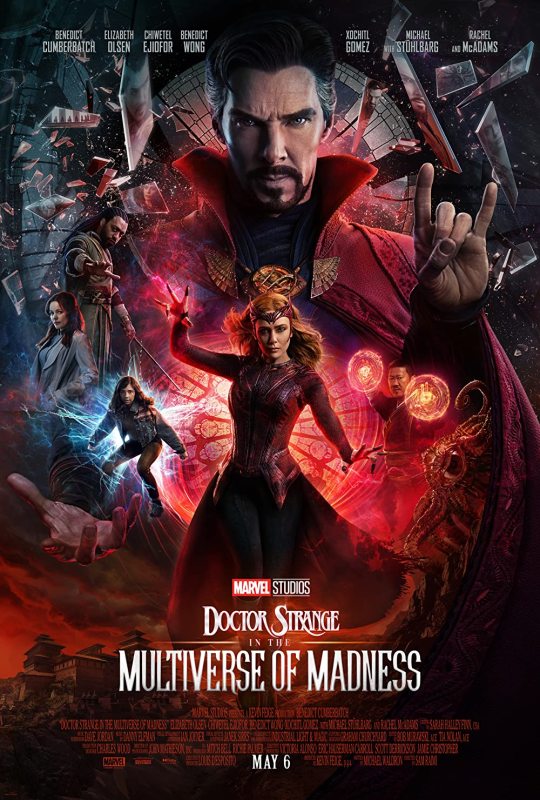
ALL THE SPOILERS IN THE MULTIVERSE
DOCTOR STRANGE IN THE MULTIVERSE OF MADNESS

THE GOOD
-When Scott Derrickson stepped away from directing DOCTOR STRANGE IN THE MULTIVERSE OF MADNESS, the rumour was that he did so because Kevin Fiege didn't like his idea of making the film "a no-holds-barred weird, gnarly, scary movie". Obviously that wasn't true because it really is a no-holds-barred, weird, gnarly and scary movie. It was obvious by the hiring of Sam Raimi that the film would hold on to those tenets because while people may associate him with his Spider-Man films, he's known by a larger audience by his EVIL DEAD films and horror films like DARKMAN and DRAG ME TO HELL.
While this film still looks like a "Marvel" film most of the time, Raimi does lean into more visually arresting looks giving the film a 70's horror feel; very Dario Argento at points.
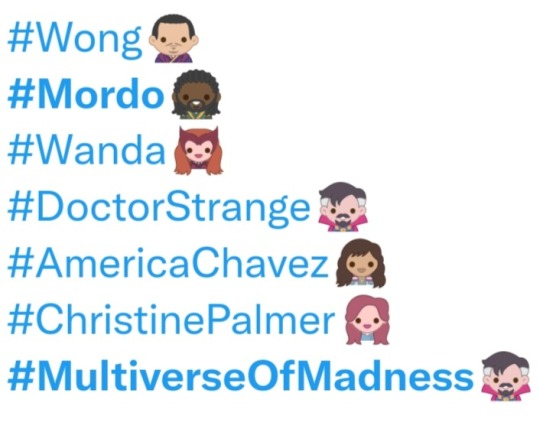
-I managed to stay spoiler free for the most part but because being on Twitter you can't help but see spoilery info spill across the timeline and using context clues I managed to figure out a few of the cameos before I saw the film, but the one thing I wasn't spoiled on was that Wanda was the Big Bad! I really thought this film would serve to atone Wanda for WANDAVISION crimes, but in fact, it doubles down on how much the darkness has enveloped her. Olsen was great as the Scarlet Witch; a true formidable foe. And just coming off of MOON KNIGHT, I'm happy to see a good villain again.
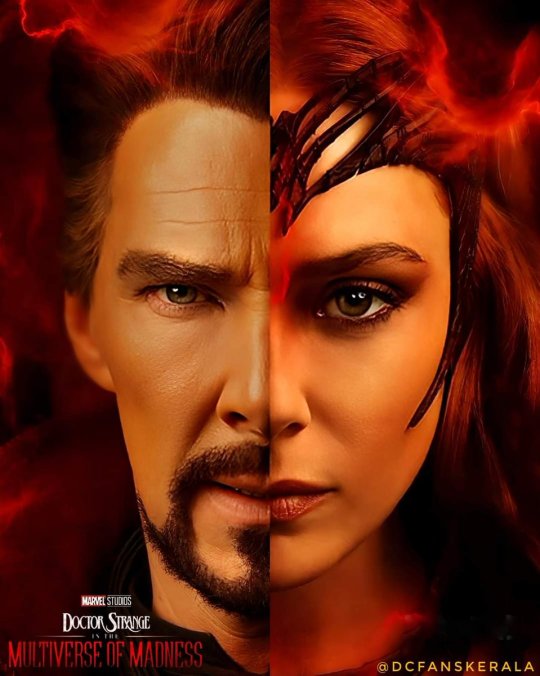
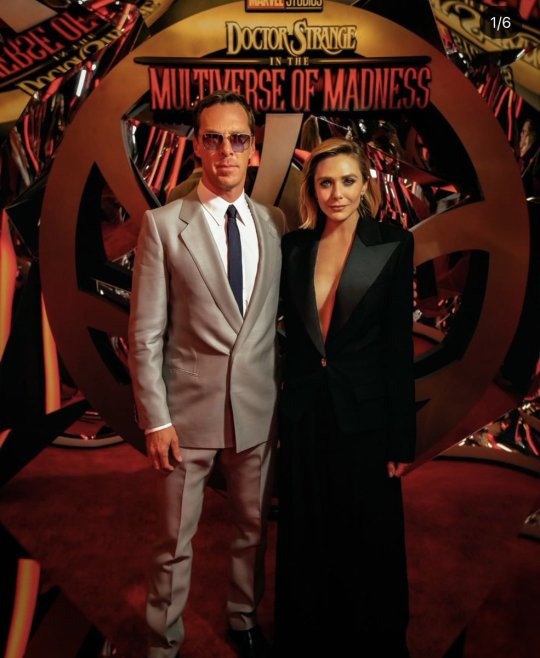
-Love that Feige has seemingly come around to the Marvel series as the rumour was that he held no love for the ones that were on Netflix and ABC. So as great as it was to see Charlie Cox in NO WAY HOME, it was equally great to see Anson Mount as Black Bolt from the failed and greatly ridiculed INHUMANS.

-Nice that Sam Raimi brought in Bruce Campbell, Ash himself, for a small role -echoing his fight with himself scene from Evil Dead.
-Rachel McAdams and Benedict Cumberbatch has great chemistry and I would like to see one of the universe's Christine actually work it out with Stephen.
-The beauty of having a film spiraling through the multiverse is that there are actual risks involved. Sure, we've had heroes die in Marvel films but it's generally towards the end of their contract (Iron Man) or the end of a phase (Black Widow). The benefit of the multiverse is that you can create mass casualties of heroes and it's thrilling because it's shocking but it's bearable because it's of no consequence. Seeing Wanda lay waste to Mr. Fantastic, Peggy Carter's Captain Carter, Lashana Lynch's Captain Marvel and Black Bolt was wonderful.
Though her killing of Charles Xavier was too much. That hurt.
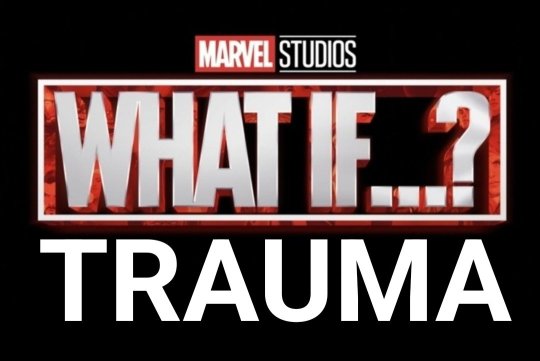
-Loved the idea that there's a Charles in another universe with a soft spot for people others have given up on. He's ever trying to find the good in someone. I just know in that universe he was playing checkers instead of chess with Magneto and still trying to keep him from committing genocide.
-Wong always coming through in the clutch.
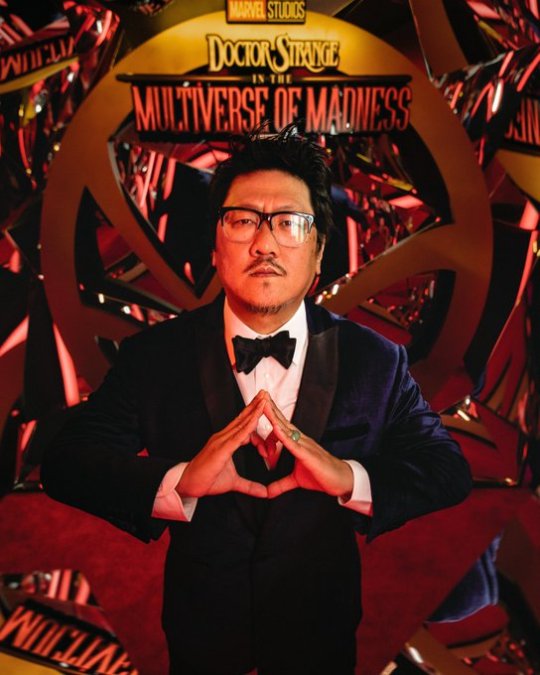
-The Danny Elfman score, especially in the musical battle was outstanding.
-Give Michael Stuhlbarg one scene and he will still take it and make it amazing. He's such a fine actor who can do so much with so little.

THE BAD
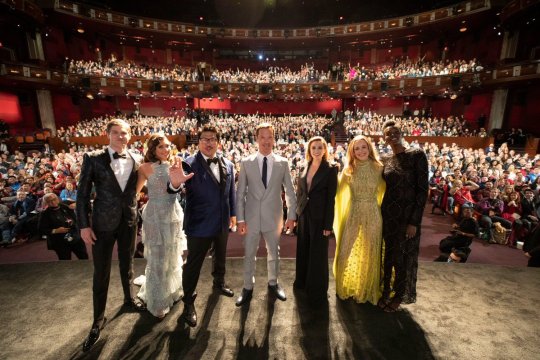
The tag "Doctor Strange will return". Why? As good as this film in, I think Strange is better served in a smaller capacity as a guide in other films (helping Thor locate Odin, helping Peter in NO WAY HOME, now showing America her strength).
I suppose the next film could lead to some connection to ETERNALS and whatever they're planning on doing with those characters, but that just shows how weak a character he is that they just can't do stories centered around him. Or at least deal with him as a person outside of the magic wielding. I think Strange is more interesting when we get the sense of his regrets, which this film tapped into a bit.
But maybe we'll see more humanity with him and Charlize Theron's character in the next film.
- I don't think they explained Wanda's actions enough in this film. If you hadn't seen WANDAVISION Wanda's heel turn in this would be too insane. I think more explanation should have been given re: the loss of Vision and how it has led her down this dark road. Just making about the kids didn't really jibe (does her sons not have powers in their universe? They should have been able to combat Wanda a bit). I don't know why they couldn't just insert a dream sequence where she's recalling her argument with Vision from WANDAVISION on what she was doing to drive it home for those who hadn't watched the series.
#doctor strange 2#doctor strange#doctor strange in the multiverse of madness#spoiler alert#spoilers#marvel mcu#marvel#mcu#comic book movies
5 notes
·
View notes
Text
Will Din Djarin and Grogu Have to Part?
Since this question has been discussed quite controversially in the fandom since the second season of The Mandalorian, here are my two cents about it.
Luke and Anakin
A subject my husband and I can’t agree upon 😉 is the character of Luke Skywalker. I always liked him, while my husband finds him annoying. But consider: Luke’s hotheadedness, his naivety, his obstinacy, are perfectly normal for a young man of nineteen or twenty. Given A New Hope’s roots in classic Western, Luke is the typical greenhorn, who tries to man it up but doesn’t know how to do it yet. Luke is a normal adolescent with dreams and ambitions. Remember how we see him playing with a toy skyhopper at his uncle’s homestead? He obviously feels safe there. His aunt and uncle later even sacrifice their lives rather than revealing to the Imperial stormtroopers where R2D2 is, because they know that Luke went in search of the droid, and they don’t want them to find him. Luke is a good boy though raw and green. In the end, his story is a success because he chooses to use his powers to save the ones he cares about, even when it’s a father who, except for saving his life at the last moment, never did anything good for him.
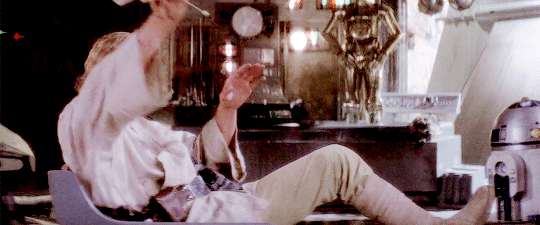
Now compare him to Anakin Skywalker, his father, at the same age: many fans define young Anakin as a whiny, arrogant brat and they’re not so wrong with that. Anakin comes over as an irritating person, much more so than his son, because he is emotionally stunted, having spent the last ten years being told to stifle his emotions and not to allow any personal attachment. Which blatantly failed: we see right away that his bond with Padmé is still intact although they didn’t meet in the meantime, and we witness him getting mad with fury and hatred when his mother has to die in that cruel, meaningless way when he could have saved her had he arrived just a little sooner. Young Anakin is unbalanced and frustrated because by now he knows his enormous powers but is not allowed to use them in a way that actually makes sense to him. Anakin is a family man: his instinct is to protect. But at age nineteen, thanks to the uncompassionate mindset of the oh-so wise Jedi, he already is a ticking bomb.
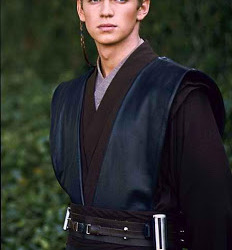
Now to Our New Heroes…
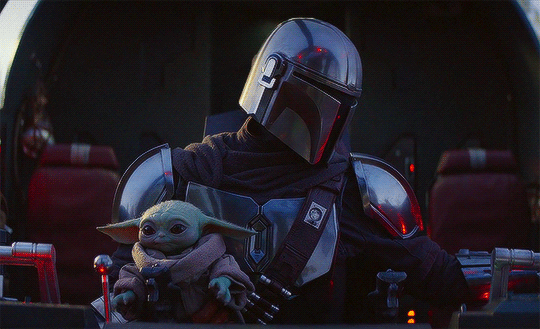
While the first season was about Mando’s redemption and hero’s journey, the second one thematizes the development of the child. Until now he hardly wielded the Force and most of the time he’s just being cute and getting into trouble, but that’s not simply bothersome, nor is it unfitting for the narrative: it’s normal. Grogu is being a child at last, because he can, and he can because someone is looking after him and genuinely caring for him.
Look at him: the little cookie monster is having a blast. He’s meeting people and making friends. He’s enjoying life (including food). He can let go, because he knows that “daddy” has his back. Literally!
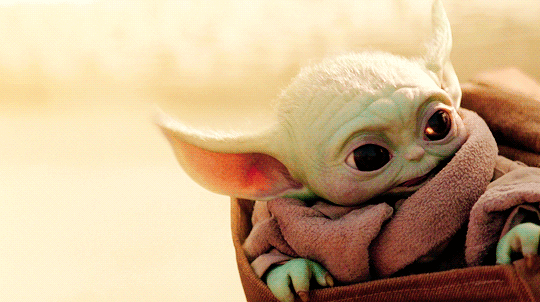
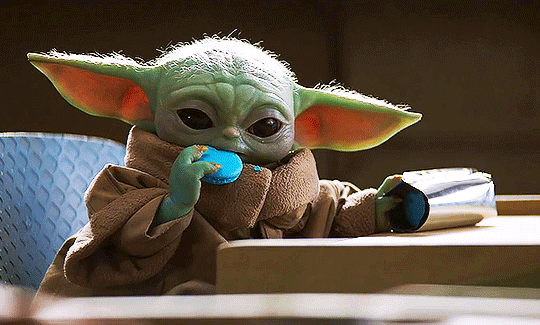
Which is why I don’t believe that Grogu will choose to join some Jedi or other: it would be pointless for his story. Grogu has the chance to be the child he could not be until now, and since he thankfully ages slowly, he’s taking that chance. Like with his predecessor Yoda, there is more to Grogu than meets the eye: he understands more than he lets on. He’s making experiences, and he’s learning from these experiences. Instinctively, he wants Mando because he wants belonging. My take is that he will learn how to have healthy attachments, and that if he is to be the future Yoda in some distant new tv show or new trilogy, he will be very different from this one in that he won’t discourage Force-sensitive children from learning how to love other people in a proper way. Also, Yoda lived mostly at the Jedi temple, which from the outside reminded of an ivory tower and indeed did shield the Jedi from seeing many of the ugly things happening outside. Grogu is travelling: he witnesses the injustices in the galaxy with his own eyes.
One of the crucial messages of the Star Wars saga always was how wrong it is to separate families. Palpatine’s greatest villainy was making people who belonged together mistrust one another until they resorted to violence. What’s worse, he enjoyed it.
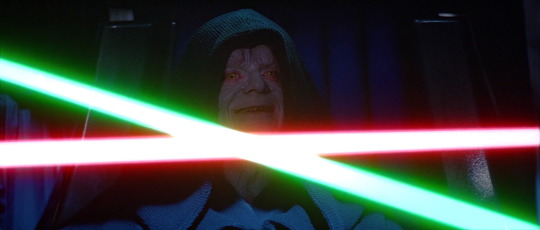
To remain in balance, children need to grow up serene and protected. Anakin, the Dark Father, was the most blatant example for this: his mere existence was a living proof for the Jedi’s failure. Terrified of his former padawan’s turn to the Dark Side, Obi-Wan set the seal on his fate right when Padmé was succeeding into making him go away with her. The Jedi was aware that Anakin was a husband and future father at this point, but the convictions of the Jedi had been so deeply ingrained into his mind since he was small that he believed them to be more important than Anakin’s role not as a Jedi, but as a human being. Still twenty years later, he tried to trick Anakin’s own son into killing him. Anakin’s soul was saved, though only by a hair’s breadth, due to his son’s stubborn compassion. Anakin had been willing to sacrifice everything to save his wife; Luke chose to rather give up his life than his integrity, which is why the moment when he throws his light sabre away before Palpatine is so significant, setting him apart from Anakin.
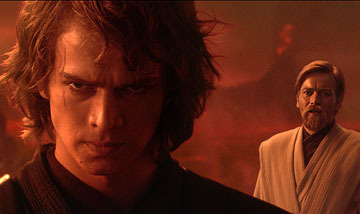
None of the surviving Jedi would have lifted a finger for Anakin: to them, he was a damned man. Which he was, but that was largely also due to the Jedi’s sins and not only his own. They never showed regret or assumed that they might have wronged him. The aim of both the prequel and sequel trilogy was not to excuse Darth Vader’s / Anakin Skywalker’s or Kylo Ren’s / Ben Solo’s terrible deeds, but to demonstrate that their fate could have been avoided; that they were not alone with their guilt but had been for a large part pushed into their role by their environment, instead of being, as the cliché runs, “mad guys who choose to be evil because they want power”, like e.g. in a James Bond movie. (Except of course for Palpatine, but even he got a second chance through Rey, equally powerful but much more well-meaning than him.)
Conclusions
The message of Star Wars is not about the all-powerful Jedi and the significance of their order: they are not some kind of superheroes who will return and save the galaxy. I daresay that who hopes to see Luke Skywalker, e.g. instructing Grogu, will be bitterly disappointed. If Luke would enter the narrative, the story would become about him, making the show’s set-up and title pointless. His story, the Hero’s Journey, was accomplished with Return of the Jedi, which is why George Lucas never wrote a continuation. Luke himself developed his capacities instinctively, both Obi-Wan and Yoda had little time to train him. (So much also for Rey being “a Mary Sue who knows how to wield her power without training”.) It obviously does not take years and years of learning at a Jedi temple to learn to wield one’s Force powers: it appears that what padawans are taught there, more than anything else, is how to control their feelings. Which is unrealistic on the long run, because every living being wishes for personal fulfilment and even the greatest Jedi can’t live solely for others.
Will the child’s Force abilities fade in time without training, the way Ahsoka said? They won’t. The show is set some 25 years after the fall of the Jedi Temple, and yet Grogu managed to make a mudhorn float in the air with his power. He was exhausted afterwards, but he managed. In another episode he healed Greef Karga from a mortal wound and he is the first Force-sensitive whom we ever saw with this capacity. In the next episode he rejected a fireball with his bare hands. The Force is strong with this one. He does not need a Jedi master to train him. What he needs is to develop a good judgement about what he should use his powers for, and when he should not.
The saga as a whole always showed a clear structure where the puzzle pieces fit together, adding up to one final picture: life is not about power but about love and belonging. Power can win, but that victory is always short-lived. Who chooses power over compassion in the end will always lose and have to look back on a destroyed world where there are only losses and bitter memories.
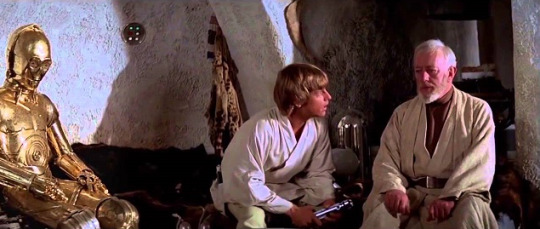

Ever from the first episode, The Mandalorian lived from the dynamics between the gruff but kind bounty-hunter and the innocent yet powerful child. At its core, it is a father-son relationship: tear them apart and the whole story ceases to make sense. By the beginning of season 2 Din Djarin and Grogu have grown so close that you could hardly fit a sheet of paper between them. Their story is not about rebuilding the Jedi order, it is about healing together, overcoming loneliness and trauma, starting a new life together.
Maybe they will be separated at the end of the second season, e.g. by Moff Gideon who wants the child for his despicable experiments: but if that happens, I can foretell what the next season will be about:
Mando will move heaven and hell to get “his” child back under his protection. Because contrarily to both Luke and Anakin, he is a father, and a good and devoted one at that.
#the mandalorian#star wars#sw#mando#grogu#baby yo#din djarin#greef karga#the jedi#the force#anakin skywalker#darth vader#luke skywalker#kylo ren#ben solo#a new hope#return of the jedi#obi-wan kenobi#padme amidala#the clone wars#moff gideon#ahsoka tano#read more#R2D2#shmi skywalker
149 notes
·
View notes
Note
Why does the fairly well adjusted, kindhearted teenager with no training in using lethal force not use lethal force? Hmmm? Got you there, Scott fans!!!!!
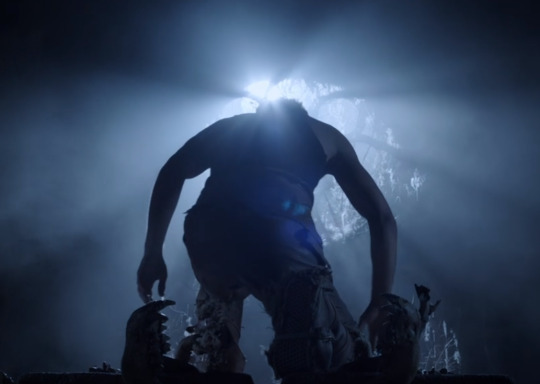
Interesting observation. It’s like you watched the show!
Someone was talking to me, last night in fact, that they believe there’s a reason many fans don’t like Scott. They said that many parts of the fandom resent that the show, in its lead, rejected “their preferred narrative of worshiping inherited power and/or power attained through violence.” I can’t really argue with it. I tend to focus on the racial aspect of fandom dislike, yet I think that they’re interrelated. It’s not just that Scott rejects the possibility of succeeding through lethal violence, it’s that he rejects it when doing so is not offered to white characters.
There are white male characters in the show who not only possess the capacity for lethal violence, they employ it as often as they can, yet it’s never shown as a victory. Peter murders ten people, even criminals in police custody, even innocent people, even allies, even family members, and it’s never portrayed as triumphant. Even his executions of Jennifer and the Mute are portrayed as signs of incipient madness and bloody horror. Derek fails miserably at trying to kill people other than his own family member which brings him nothing put pain, and loses his replacement pack in the process. Matt is more successful, but his motivations are shown as rather pathetic deficiencies in his personality. Gerard keeps getting screwed by his own strategies. Stiles is almost destroyed by the lethal violence he grasps for in desperation.
To these parts of the audience, that’s not how it’s supposed to be. Think about other examples of supernatural shows on television: Buffy the Vampire Slayer, Angel, True Blood, The Vampire Diaries, the Originals, etc. Violence -- especially death in judgement -- is the prerogative of protagonists. In fact, one of the ways they mark the protagonist in these shows is the casualness of how they approach lethal violence. How many times did Buffy casually kill vampire extras like an afterthought? Don’t get me wrong, I love BTVS, but Buffy’s execution of vampires is ultimately reduced to something banal, like brushing her teeth.
Connected to this is a number of tropes that they love, especially that of aristocratic or superior white men -- deprived of their rightful place or recognition in the world -- conquering those who oppress them and punishing them, even killing them, and thus they reassert justice in the world. It’s literally written into the genetics of fiction that the hero kills the villain.
Yet, the audience has trouble remembering that the biggest victim -- though not the only victim -- of Season 1 is Scott McCall. He had a life -- not a great one, but not a bad one either -- he had hopes and dreams. He didn’t want to sit on the sidelines anymore, he wanted to play first line and he worked for it. His father was neglectful, but he had a great mom and a fantastic best friend.
When Peter chooses him to become his murder assistant, it all goes downhill from there. He lies to his mother. He stalks Stiles in the locker room and disappoints him repeatedly due to his lycanthropy. It threatens his relationship with Allison. Derek manipulates him and uses him to hunt and kill the alpha. Peter violates him and threatens his loved ones. The Argent parents’ whole purpose in life is to kill him. This injustice can’t be solved through lethal violence; this injustice is caused by lethal violence.
And yet, the audience gets confused when he tells Deucalion “I’m not like you. I don’t have to kill people.” It just doesn’t occur to them (the villains or parts of the fandom) that Scott simply doesn’t want to be forced to do to others what was done to him. People complain that he’s a hypocrite because he makes first line due to his werewolf abilities while disliking being a werewolf, as if he’s supposed to stop playing and focus on being the Hale Family’s newest servant in gratitude. Yeah, he gets power, but the cost is constantly too high, such as when Stiles compliments Erica’s appearance in Season 2, and Scott says “How good do you think she's gonna look with a wolfsbane bullet in her head?” Scott’s breaking the established script the audience expected, where he learns to relish his power over others. When Derek manipulates Scott into believing that he has to kill the alpha to be human again, Scott’s determination to do it is not presented as Scott’s decision to serve justice but as Scott’s desperation to make the nightmare end.
Yet it doesn’t end, does it? Do we ever see Scott have a season enjoying first line at all? Do you think he loved being a werewolf when he held Allison’s dead body in his arms or watched Kira join the Skin-walkers? When he used his supernatural hearing to listen to his mother cry or Dr. Geyer struggle to save her life? When he watched Derek fall from the ledge in the mall and think it was his fault? He rejected the capacity to do lethal violence to others as a way of reasserting justice in the world because he never saw the use of violence successfully restore anything. Peter’s defeat in Season 1 and 4 ended a nightmare -- it didn’t erase the monumental changes to his and his friend’s lives, the horror they lived through. Matt died miserably; Gerard died miserably; Jennifer died miserably; Derek gathered more pain into himself. No one lived happily ever after because they could kill the people who hurt them -- they just continued the cycle.
Scott’s development as a protagonist -- and, not coincidentally, his subversiveness as a character in an action-adventure show -- hinges on his increasing capability to employ lethal violence as a corrective, while constantly repudiating it as anything but an unfortunate and painful necessity. Do you notice that he never talks about or takes pride in the defeat of his enemies? Not Peter, not Derek, not Gerard, not Jennifer, not the Nogitsune, not Kate or Theo or The Beast or Douglas or the Anuk Ite. He defeats them and then he’s done. There’s no celebration of the defeat of the enemies, like Ewoks dancing while burning stormtrooper helmets at the end of Return of the Jedi. He employs violence when he has to, he regrets the necessity, but he doesn’t dwell on what they did to him. Instead, he has hope for Peter and Deucalion and Theo.
Why? Because the motivation to reassert justice in the world by punishing enemies - the privilege of other heroes - is what ruined his life in the first place. Lethal violence invaded his life and changed it, down to his very nature. He’s never going to treasure it. He’s never going to turn to it first. Why should he?
69 notes
·
View notes
Text
WoT AU: Perrin’s Cursed Shadar Logoth Ax
Concept: WoT AU where Perrin is the dumbass who keeps a shiny cursed ax from Shadar Logoth, while Mat drops the dagger before leaving Shadar Logoth and ends up getting wolf powers instead, so they get each other's powers and story paths. Their personalities are the same.
What's really interesting about this is how much it highlights that the individual ta'veren struggles are actually at root the same; all of the boys struggle to accept both the responsibilities and the violence that the narrative pushes on them.
However, the boys don't struggle with the same issues to the same degree! So if you give responsibility-avoidant Mat the plotline that incentivizes responsibility, and violence-repulsed Perrin the plotline that incentivizes violence, they hit their growth points quicker and get over their internal conflicts faster. XD
I’ll put the plot and characterization details under the cut. Also, shout-out to @adurna0, ßætåñŵå£k€r ßùprëmê, and Pexitron for contributing enthusiasm, questions, and ideas to this nonsense.
Mat’s Path: Beloved Culture Hero With Daydreaming Superpowers
In the original universe Mat's internal struggle is to come to terms with responsibility (with his spelled-out fate as catalyst), and his external struggle is about leading battles and revolutionizing warfare. In the AU, he'd be put in a position of responsibility after saving everybody and he'd behave better because he was being appreciated and trusted, and the only struggle would be to stop him from using the Wolf Dream for literally everything, including battles somehow.
I think Mat would likely be kind of uneasy about the wolf powers at first, but he'd LOVE Tel'aran'rhiod, he's always daydreaming, and that's a place where your daydreams become real. He'd test out all of his fun wolf powers and Dreamwalking abilities immediately. Hopper would still be exasperated but for completely different reasons. Mat would also go back and rescue Emond's Field from Trollocs and Whitecloaks and turn it into a trading empire. At some point when Perrin returns from Rhuidean, Mat would go on a special mission to steal Perrin's hat, because frankly Perrin wouldn't keep wearing it after leaving the Waste anyway, and it looks better on Mat. This is my only concession to the original storyline’s aesthetics.
Unlike Perrin, Mat would not hesitate to rescue people from Masema, and he'd be good at the political stuff. He'd love being viewed as a hero, though he'd possibly have some of the same struggles Perrin did re: taking on leadership, because it implies responsibility. But with Mat, it's more that he'd pitch in during a crisis automatically and then bitch about it after, and I think after people started giving him positive attention for helping them, he'd act out and complain less.
He and Faile wouldn't be into each other but they'd be bros (a little like him and Birgitte in the original universe) and have a good working relationship; Faile would be his work wife (but not his actual wife) in his role as Lord of the Two Rivers. Mat's love interest in this situation is Berelain, but it's a very slow burn. (I can’t imagine anything but a slow burn romance for Mat, he’s just built for it.)
He'd be freaked out about Berelain at first (due to getting the Min advice about running from the most beautiful woman you've ever seen) but eventually he'd be like 'wait, hang on, I do not take advice' and he'd court Berelain and even more eventually succeed. Probably Berelain is the one who gets kidnapped by the Shaido in this version? Also, he would absolutely kick Lanfear's ass in Tel'aran'rhiod, with or without the power of love.
Perrin’s Path: Luckily, I’m Very Qualified For This Job
Ok, so on to Perrin. In the original universe, Perrin's internal struggle is to come to terms with his capacity for violence (with his wolfman destiny as catalyst), and his external struggle is about taking on political and social responsibility. In the AU, Perrin would now have actual stakes for the hammer vs ax issue, so it would get resolved sooner. Also, Perrin's issues with responsibility aren't 'I don't want to work hard', they're 'I'm not the right man for the job'. Once Perrin has the thought "The Pattern has specifically prepared me to be really good at killing people, that's my job now", he'd just go do his job.
Again, I like to think that Perrin still has the hammer vs ax dilemma, but now has rather different stakes, and Perrin might be a lot more concerned than Mat ever was about the lingering darkness in his soul. I think that's what prompts him to go through the stone doorway in the Stone of Tear, in this universe. Unlike Mat, he knew specifically what he was going to ask for in the Rhuidean doorway, so he asks for them directly (I haven't quite worked out what his accessories would be in this universe, but I bet one of them is a hammer. Maybe the ashandarai becomes a war hammer?)
His big internal bugaboo is whether all of his new battle memories make him a bad person and whether he’s tainted forever by the ax, so he spends way more time than Mat ever did feeling bad about being really good at war. However, once he decides, 'Well, I'm working for the light, this is clearly my job now, and I have the tools for it, so I should do my job and take pride in my work," he's fine.
I also think that, being a blacksmith, he would be more familiar than Mat is with metalworking and would invent cannon way earlier. He would invent cannon so early that I also think he would have time to invent guns. That's right, in this universe, Perrin has a gun. He probably forges a gun with the One Power. He'd also make it out of *Finnland earlier than Mat, and with all of his body parts, because a) Perrin would absolutely bring guns to fairyland, b) Perrin doesn't give a shit about the delicate rules of fae bargains and c) Perrin would have obsessed over the puzzle of the gift he didn't specifically ask for, and would have known before he entered *Finnland what it was for, so once he found Moiraine he'd be able to escape immediately.
Perrin and Tuon get married somehow, but there's no love there and by the end of the series they're both fully intending to kill each other. (Tuon doesn't trust him and is pretty sure he's going to be a huge threat to her rule; she doesn't flirt with him by threatening to kill him, because when Tuon wants you dead, you are just dead, she doesn't telegraph her intentions.) Perrin feels bad about having to kill his wife, but the Seanchan are evil and there's no way in hell Perrin's leading their armies after all this is over, so she's gotta die. Perrin might manage it first, since Tuon would wait till after the Last Battle, but then Selucia or literally any other Seanchan party would immediately kill Perrin. So. Hopefully everybody stays their hand till after the Last Battle, because otherwise the Light is screwed in this scenario.
#wheel of time#wheel of time au#wheel of time spoilers#wheel of time meta#mat cauthon#Perrin Aybara#ta'veren role reversal AU#honestly it's mostly a good universe unless you are an Original Universe Ta'veren Love Interest#and as long as Perrin can refrain from killing his wife until the rest of the world is saved#and as long as you don't mind that Mat can see your dreams which frankly I find very upsetting
32 notes
·
View notes
Note
What do you think of Society of Superheroes : Conquerors of the Counter-world ?
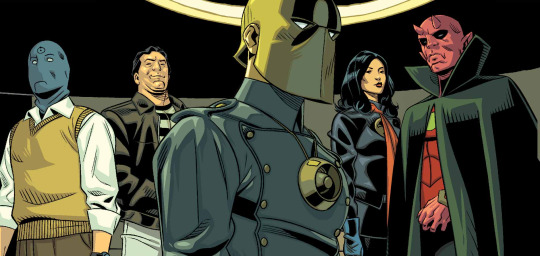
While my favorite of the alternate Earths pitched in Multiversity would actually be Earth 13, Earth 20 I think could have easily sustained a strong ongoing if they ever come back to it. It approaches it's "pulp" aspect not nearly as over-the-top as it could have (and that's a compliment), especially considering how over-the-top the rest of Multiversity and Grant Morrison's work can get, instead it's just exaggerated enough to align up with what you'd expect from comic book superheroes reinterpreted through pulp hero lenses.
I love that the main cast here is not comprised of Justice League analogues. I'm fairly sure that if you asked most people, most writers or artists, to create a "pulp take on the DC universe", you'd end up centering around the story around "retro" recreations of the Justice League, like Superman as a Doc Savage adventurer or Batman as a gun-toting vigilante, but here you have these characters from much more varied sources that only required the smallest of tweaking to be convincingly genuine pulp heroes, still following along some of the general archetypes but solid enough to stand on their own, even if you remove the entirety of the DCU around them, even if you somehow transported them back into a 1930s time period. I really gotta give it credit for how genuine it's characters feel even if they weren't designed to last. Doc Fate in particular I'm pretty sure could easily work as a stand-alone character in the DCU, if not the outright replacement for Dr Fate. He definitely seems more popular.
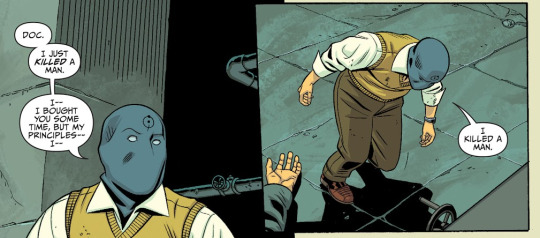
Something that I particularly like about it is also that a substantial part of the story is devoted to the heroes grappling with the changes being brought about their world, as a result of the invasion both from the neighboring supervillains as well as the general story of Multiversity. Doc Fate is forced to hook up a character to a torture brainwashing device (a reference to Doc Savage's own brainwashing programs), and he remarks of his own fears towards his growing lack of humanity. The Mighty Atom, the team's youngest and most innocent member, briefly despairs over the fact that he's had to kill someone. And Vandal Savage's final line is his remarking that he's won by turning the heroes into killers, as it's his murder that calls forth Niczhuotan, The Destroyer of Worlds, who looms menacingly over the final page.
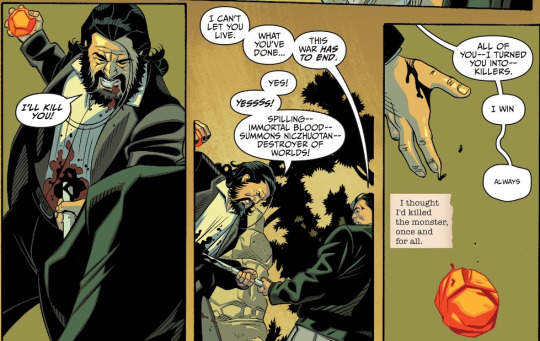
While I'd hardly call it a "debate", it's an interesting perspective to explore the "superheroes who kill" aspect that's pervaded so many discussions of superheroes and pulp heroes alike. The DCU's superheroes are mostly defined by their refusal to kill, it's the one thing it's two major icons have in common above all else, and of course, it's something that a lot of the more famous pulp heroes didn't have a problem with. Here, the fact that these superheroes are being forced to kill and resort to desperate tactics to combat the growing menace is framed as one of the many ways in which everything is going to hell in the multiverse. None of these guys wanted to kill or injure anyone when they signed up for the Society, of course they don't, they are old school DC superheroes. But they don't live in a DC superhero world, they live in a pulp hero world where they've spent the last 5 years desperately fighting off the invasion of pirates that only wish to spread, in Savage's own words, "rape and cruelty", and lacking the superpowers and great moral high ground and perpetual safety of status quo of the DCU proper, and when their science and superpowers fail, they must resort to that oldest and most barbaric of tools, here best embodied through the stone and spear that the two immortals wield in their final duel. I would very much like to read a story about the fallout and rebuilding of society in the aftermath.
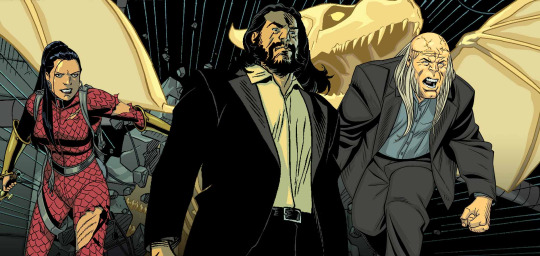
Earth 40 is another concept I would like to see explored more in-depth. Like with Earth 20, I very much appreciate the choices of supervillains in this, and particularly the fact that it's Vandal Savage here leading the pack. I retract my statement of Ra's al Ghul as the DCU's premier Pulp Supervillain, because in retrospective, Vandal Savage has always been the most qualified for that position and the only one who's actually been used in that specific capacity. They do a good job as a great menace able to shake up the foundations of the world they are opposite to.
However, while I don't think this could have been dwelved into in the span of just one issue, the premise of "A DC world but ruled by pulp villains" actually does have more potential than was ever suggested by what these issues brought, and Earth 40 does come across to me as a bit of wasted potential. As I've argued before, pulp supervillains have a long and fascinating history, and supervillains in itself are a concept that's really evolved and grown (and possibly born alltogether) in the pulps, long before comic books and their superheroes. Superman may be considered the first superhero with only some dispute, but long before him, we had supervillains with a capital S like Fantomas and Fu Manchu and Zenith and Dr Jack Quartz running rampant, and supervillains from even before the American pulps proper like Count Fosco, Father Rodin and The Black Coats, characters that were indisputably supervillains by every definition.
The real life history of the supervillain as a concept, it's biggest players from before comics, and the decades by which the supervillain predates the superhero, have never factored into The Big Two's superhero universes (or even any superhero universes I can think of) in the ways that the superhero's history has, so having an alternate Earth to explore that I think could be a very interesting idea and would allow Earth 40 to work even separately from it's conflict with Earth 20.
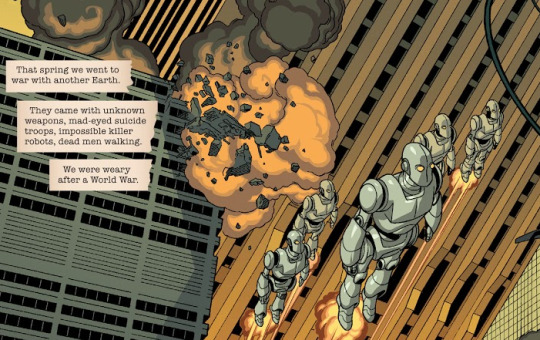
#replies tag#pulp heroes#pulp villains#dc comics#vandal savage#doc fate#multiversity#grant morrison#superheroes#supervillains
18 notes
·
View notes